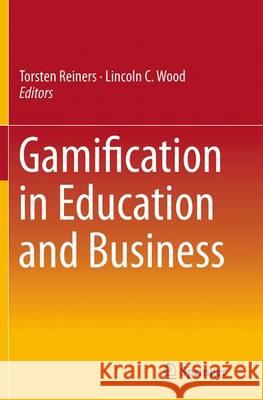Gamification in Education and Business » książka



Gamification in Education and Business
ISBN-13: 9783319344300 / Angielski / Miękka / 2016 / 710 str.
Gamification in Education and Business
ISBN-13: 9783319344300 / Angielski / Miękka / 2016 / 710 str.
(netto: 1073,48 VAT: 5%)
Najniższa cena z 30 dni: 963,86
ok. 22 dni roboczych.
Darmowa dostawa!
This book is dedicated to applied gamification in the areas of education and business, while also covering pitfalls to avoid and guidelines needed to successfully implement for a project.
"This book will occupy an honored place in our school's professional development library for teachers and administrators. Gamification is a veritable goldmine of material for teacher training sessions. ... Gamification offers a plethora of evidence, again, provided by worldwide experts. If a teacher or administrator still has questions regarding the effectiveness of gamification, somewhere within this book's 700+ pages there's bound to be an adequate answer." (David W. Deeds, Technology, Knowledge and Learning, Vol. 21, 2016)
Introduction.- A RECIPE for Meaningful Gamification.- Studying Gamification: the Effect of Rewards and Incentives on Motivation.- A Conceptual Framework for Gamification Measurement.- Implementing Game Design in Gamification.- Applied Behavioral Economics: A Game Designer’s Perspective.- Towards Leveraging Behavioral Economics in Mobile Application Design.- A Parallel Universe: Psychological Principles in the Language of Game Design.- Context to Culture for Gamification HCI Requirements: Familiarity and Enculturement.- Psychological Theory and the Gamification of Learning.- A History and Frameworks of Digital Badges in Education.- Game-Based Assessment: The Mash-Up We’ve Been Waiting For.- A gamification-based framework for developing learning activities of computational thinking.- Educational Gamified Science Simulations.- From Market Place to Collusion Detection: Case Studies of Gamification in Education.- Physical skills and digital gaming – the relationship between basketball and an augmented reality adaption.- Storytelling to Immersive Learners in an Authentic Virtual Learning Environment.- Shaping Behaviours through Space and Place in Gamified Virtual Learning Environments.- The Development and Assessment of a Team-based Management Game.- Gamification in Virtual Worlds for Learning: A Case Study of PIERSiM for Business Education.- Theoretical Considerations for Game-Based e-Learning Analytics.- Critical Perspective on Gamification in Education.- Implementing Gamification: Requirements and Gamification Platforms.- Workplace Psychology and Gamification: Theory and Application.- The Gamification as a Resourceful Tool to Im-prove Work Performance.- Gamification in the Enterprise: Differences from Consumer Market, Implications, and a Method to Manage Them.- Designing gamification to guide competitive and cooperative behavior in teamwork.- Gamification & Law.- How to Avoid the Dark Side of Gamification: Ten Business Scenarios and Their Unintended Consequences.- Gamification of Survey Research: Empirical Results from Gamifying a Conjoint Experiment.- Project knowledge management while simply playing! Gaming mechanics in project knowledge management systems.- How Gamification Can Help Companies to Become More Sustainable – a Case Study on Ride Sharing.- Gamification: Supported Exploration and Practicing for Automotive User Interfaces and Vehicle Functions.- Application of Game Thinking and Game Elements in New Joiner Induction and On-boarding Process: A Business Case Study.- Gamification: The Measurement of Benefits.
Dr Torsten Reiners is Senior Lecturer in Logistics at the Curtin University, Australia. His research and teaching experiences are in the areas of operations research, but include instructional design, development of adaptive learning environments, distant collaboration, and mobile learning. His PhD Thesis is about adaptive learning material in the field of operations research. He participated in multiple projects to use 3D spaces for learning support; i.e. to improve the authenticity of learning in classes about production and simulation. He is project leader on a competitive grant from the Australian Office of Learning and Teaching (www.ndive-project.com) about developing a theoretical framework for authentic and immersive education with gamified elements.
Dr Lincoln C. Wood is a Senior Lecturer (operations and supply chain management) at Auckland University of Technology (New Zealand) and an Adjunct Research Fellow at Curtin Business School (Australia). He received the Council of Supply Chain Management Professional’s (CSCMP) Young Researcher Award in 2009 in the USA and earned his PhD at the University of Auckland (New Zealand). After developing a strong interest in effective supply chain education, Dr Wood received the Outstanding Research Award at the International Higher Education Conference in 2010 and is now the Project co-Leader on a competitive grant from the Australian Office of Learning and Teaching (www.ndive-project.com). Dr Wood has published in leading international journals including Transportation Research Part B: Methodological, International Journal of Operations & Production Management, The Service Industries Journal, Journal of Performance of Constructed Facilities, and Habitat International.
This book is dedicated to applied gamification in the areas of education and business, while also covering pitfalls to avoid and guidelines needed to successfully implement for a project. Using different theoretical backgrounds from various areas including behavioral economics, game theory, and complex adaptive systems, the contributors aim to help readers avoid common problems and difficulties that they could face with poor implementation. The book’s contributors are scholars and academics from the many areas where the key theory of gamification typically comes from. Ultimately, the book’s goal is to help bring together the theories from these different disciplines to the field of practice in education and business.
The book is divided into four parts: Theory, Education, Business, and Use Cases. Part I provides a foundation on the theory of gamification and offers insight into some of the outstanding questions that have yet to be addressed. In Part II, the application and value that gamification can bring within the education sector is examined. The book then changes focus in Part III to spotlight the use of gamification within business environments. The topics also cover educational aspects like improved learning outcomes, motivation, and learning retention at the workplace. Finally Part IV concentrates on the applications and use of gamification through a series of case studies and key elements that are used in real situations to drive real results.
1997-2026 DolnySlask.com Agencja Internetowa
KrainaKsiazek.PL - Księgarnia Internetowa









